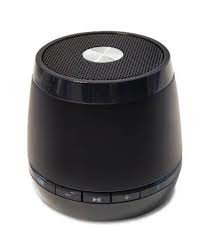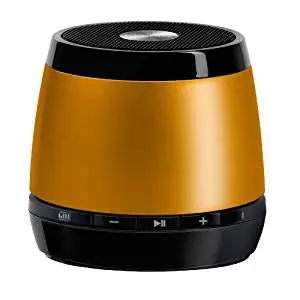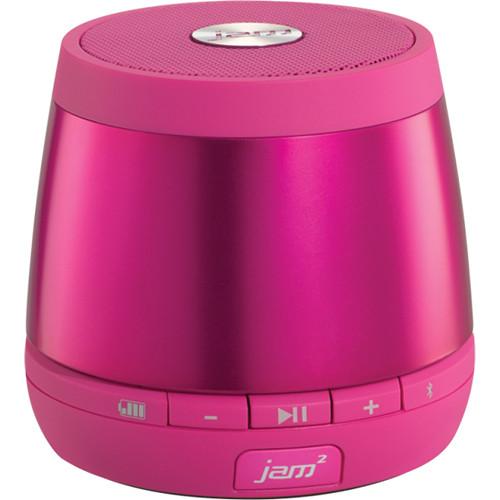User manual HMDX Jam Party is a certain type of technical documentation being an integral element of any device we purchase. These differ from each other with the amount of information we can find on a given device: e.g. HMDX Jam Party. Discuss: HMDX Dynamite - speaker - for portable use - wireless Sign in to comment. Be respectful, keep it civil and stay on topic. We delete comments that violate our policy, which we encourage.
User Manual
Charging Cord
Speaker
1. Hook it up old-school.
2. The power cord goes here.
3. That light lets you know when
Bluetooth has the hook up.
4. Check out how much juice is in
the battery.
5. Turn the music up or down. (Wait,
why do you need to turn it down?)
6. Push it to play, push it
again to pause.
7. That’s the power button, press and
hold for 5 seconds to power on.
CHARGE
RED (when plugged in)
Charging
Flashing RED
Low Battery
Ready to Party
Light Off
Quick Flash BLUE
Pairing Mode
Slow Flash BLUE
Connected
RED
Line-In Mode
What It Looks Like
What it Means
2
1
7
6
4
3
5
5
USER GUIDE AND WARRANTY INFORMATION
HX-P140
©2014 HMDX. All Rights Reserved.
IB-HXP140
Register your speaker at www.hmdxaudio.com. Information like where
you bought it and how you’re using it is like gold for the people who make
these speakers. Do them a solid, will ya?
Por manual de instrucciones e información de garantía en español
visítenos en www.hmdxaudio.com.
The HMDX Hangtime has friends—like, lots of them. Check them all out at
www.hmdxaudio.com.
Setup is pretty easy, but we put a manual together just in case you need it.
It’s full of information and sarcasm—just like that English teacher you had
that crazy semester.
HEY. HAVE WE SEEN YOU HERE BEFORE?
PACKAGE CONTENTS

JUST CHARGE IT
BLUETOOTH
®
CONNECTION: IT’S A SETUP
ALLOW US TO SHED SOME LIGHT
HOOKING UP OLD SCHOOL AUDIO, JACK
CONTROL YOUR DESTINY...
OR AT LEAST YOUR SPEAKER
Charging the speaker is so easy you’ve probably
figured it out by now, but just in case, you’ve got
two options: your computer or a wall outlet.
Now go get ready for an epic night while your speaker does too.
It needs about 3 hours of me time for 4 hours of party time.
1. The cord that came with the speaker —
the one with the USB on one end and
the Micro USB on the other — will
work with your computer.
2. If you want to use the wall outlet, you’ll
need to pick up a power cord with a
Micro USB the next time you’re at the
store or use any USB AC adaptor,
including the one for your cell.
Like any amazing couple, this one starts with a connection—one between
your device and the speaker’s
Bluetooth.
Here’s how it works:
1. We know you’re probably going to think, “derp” with this one, but we
have to say it: Make sure the smartphone, tablet or computer you want
to hook up to the speaker has
Bluetooth. (There. We got that out of the
way.)
2. Turn on the speaker and look for the little blinking light.
3. Do whatever your device needs you to do on its end. (We don’t know
what you’re using. We’re not spies.)
4. Look for HMDX Hangtime in your device’s Bluetooth
list or click
YES—whatever pops up on your device—and BAM! you’re
connected.
Hmdx Jam Wireless Speaker Setup
5. Now hit PLAY on your speaker and crank it up—or down if you’re
lame.
You’re probably only going to have to do this once, unless your device
goes through a major I-just-dropped-it-in-the-pool kind of reboot. The
device and Bluetooth will find each other every time just as long as the
speaker is set to Bluetooth and your device’s Bluetooth is, you
know—on.
If you’re connecting to a computer, you may have some extra steps on
that end. You’ll have to get that information from the computer company.
Depending on your device you may be prompted to enter a pairing code.
If prompted, enter “0000” as the code.
Press and hold PLAY/PAUSE for 5 seconds to activate pairing mode.
Note: If you turn on your Hangtime but haven’t started the party, it will
automatically power off after 2 minutes of unpaired inactivity.
1. Plug one end of the cord into the speaker and the other into the
headphone jack on your device.
2. Turn on the speaker.
3. Hit PLAY on your device and crank it up—or down if you’re lame.
You’ll have to play and pause the music from your device, not your
speaker. No problem. You’re there anyway, right?
Package contents just charge it, Bluetooth, Connection: it’s a setup
Por manual de instrucciones e información de garantía en español visítenos en
www.hmdxaudio.com
The HMDX Neutron has friends—like lots of them. Invite them
along next time for an even more epic night. You can check out all
their online profiles at www.hmdxaudio.com.
Setup is pretty easy, but we put a manual together just in case you
need it. It’s full of information and sarcasm—just like that English
teacher you had that crazy semester.
Charging the speakers is so easy you’ve
probably figured it out by now, but just in
case, you’ve got two options: your
computer or a wall outlet.
1. The cord that came with the
speaker—the one with the USB on one
end and the Micro USB on the
other—will work with your computer.
2. If you want to use the wall outlet, you’ll
need to pick up a power cord with a
Micro USB the next time you’re at the
store, or use any USB AC adapter,
including the one for your cell.
Now go get ready for an epic night while your speaker does too.
It needs about 3 hours of me time for 4 hours of party time.
Package Contents
Just Charge It
User Manual
Charging Cord
Speaker

Control Your Destiny…or at Least Your Speaker
Allow Us to Shed Some Light
1. Turn the music up or down. (Wait,
why do you need to turn it down?)
2. Push it to play, push it again to pause.
3. That’s the power button, press and
hold for 5 seconds to power on.
4. That light lets you know when
Bluetooth has the hook-up.
5. That’s the mic.
6. The power cord goes here.
7. Hook it up old-school.
8. Easy pull tab.
Like any amazing couple, this one starts with a connection—one between
your device and the speaker’s Bluetooth.
Here’s how it works:
1.
We know you’re probably going to think, “derp” with this one, but we
have to say it: Make sure the smartphone, tablet or computer you want to
hook up to the speaker has Bluetooth. (There. We got that out of the way.)
2.
Turn on the speaker and look for the little blinking light.
3.
Do whatever your device needs you to do on its end. (We don’t know
what you’re using. We’re not spies.)
4.
Look for HMDX Neutron in your device’s Bluetooth list or click
YES—whatever pops up on your device—and BAM! you’re connected.
5.
Now hit PLAY on your speaker and crank it up—or down if you’re lame.
You’re probably only going to have to do this once, unless your device goes
through a major I-just-dropped-it-in-the-pool kind of reboot. The device and
Bluetooth will find each other every time just as long as the speaker is set to
Bluetooth and your device’s Bluetooth is, you know—on.
If you’re connecting to a computer, you may have some extra steps on that
end. You’ll have to get that information from the computer company.
Depending on your device you may be prompted to enter a pairing code.
If prompted enter “0000” as the code.
To clear the pairing history hold the PLAY/PAUSE button for 5 seconds.
Note: If you turn on your Neutron but haven’t started the party yet, it will
automatically power off after 2 minutes of unpaired inactivity.
Bluetooth
®
Connection: It’s a Setup
CHARGE
Flashing RED
Low Battery
Charging
Fully Charged
RED (when plugged in)
Light turns off
(when plugged in)
Quick Flash BLUE
Pairing Mode
Slow Flash BLUE
Connected
RED
Hooking up old-school
with a cord
What It Looks Like
Hmdx Jam Wireless Speaker Troubleshooting
What it Means
HX-P120
Hey. Have we seen you here before?
Register your speaker at www.hmdxaudio.com.
Information like where you bought it and how you’re
using it is like gold for the people who make these speakers. Do them a solid, will ya?
USER GUIDE AND WARRANTY INFORMATION
CHARGE
AUX-IN
6
8
7
3

2
1
1
4
5
Hooking Up Old School Audio, Jack
1. Plug one end of the cord into the speaker and the other into the
headphone jack on your device.
2. Turn on the speaker.
3. Hit PLAY on your device and crank it up—or down if you’re lame.
You’ll have to play and pause the music from your device, not your speaker.
No problem. You’re there anyway, right?